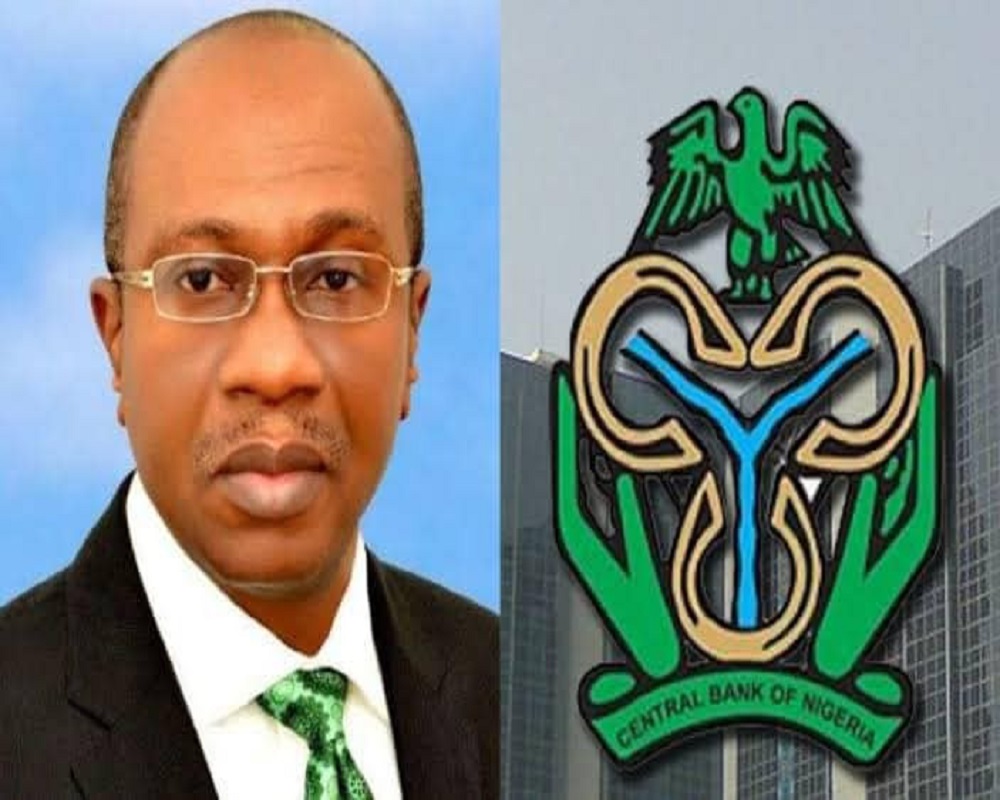E-Financial
CBN unveils “SabiMONI” platform to promote financial literacy, inclusion

Central Bank of Nigeria (CBN), on Monday unveiled an e-learning platform, SabiMONI, to promote financial literacy and to deepen financial inclusion, according to a report by News Agency of Nigeria.

Speaking at the ceremony, Mr Godwin Emefiele, CBN Governor, said that the platform was a fully digital national e-learning platform that provided a knowledge base for financial literacy.
According to him, SabiMONI is aimed at providing individuals with the opportunity to be trained and to become Certified Financial Literacy Trainers (CFLT) through self-service.
“The platform is aimed at supporting our efforts toward ramping up the number of experts that can be used to drive financial education in the country and perhaps beyond.
“One of the key drivers of financial inclusion today, is no doubt financial literacy.
“It is a prerequisite for greater financial inclusion, which would lead to the stability of the financial system and ultimately economic growth and development,” he said.
Emefiele said that the absence of or low levels of financial literacy constituted an impediment to financial inclusion.
“In other words, the pace of financial inclusion is directly related to the level of financial literacy and financial capability.’’
He said that to address the financial inclusion gaps, the National Financial Inclusion Strategy 2022, identified increasing adoption and usage of financial services in priority demographics.
He said that such demographics comprised of the most vulnerable segments such as women, youth, MSMEs and rural dwellers.
“And especially, the Northern part of the country as well as expansion of digital financial services and platforms amongst its strategic priority areas.
“To enable us to achieve these, we must take deliberate steps to upscale financial capability through financial education programmes.
“The shortage of skilled and experienced persons to drive financial education remains a major hindrance.
“Interestingly, the National Financial Inclusion Strategy 2022 places high priority on financial and digital learning.
“This will serve as a strategy that would enable the creation of a conducive environment for serving or ensuring the inclusion of the most excluded groups,” he said.
Mrs Rashida Monguno, Director of Consumer Protection, CBN, said that financial literacy remained a key driver of financial inclusion globally.
According to her, it encompasses knowledge and skills that enable individuals to effectively manage financial resources to enhance their economic well-being.
“But it also includes trust, confidence, and participation in the formal financial system.
“Financially literate consumers are always able to make better financial decisions. This is a catalyst for greater financial inclusion and stability of the financial system.’’ she said.
She said that penetration of financial literacy in Nigeria was still low, with a current rate of 64.1 per cent.
“This, no doubt, may not be unconnected with shortage of skilled financial literacy trainers and limited avenues or channels for financial education.
“Latest results from the Access to Finance Survey by Enhancing Financial Innovation and Access (EFInA) suggest that the low level of financial literacy continues to constitute a barrier to financial inclusion,” Monguno said.
She said that SabiMONI was conceived as an avenue for driving financial education amongst the target segment of the Nigerian population to facilitate financial education programmes for end beneficiaries.
“It will also support efforts at enhancing financial inclusion through digitalisation.
“It would serve as a channel for propagating Digital Financial Literacy thereby ramping up adoption and usage of Digital Financial Services.
“With the launch of the SabiMONI platform, we now have a knowledge base where individuals can learn about financially literacy at their own pace from their comfort zones and with ease,” she said.
According to Mrs. Aisha Ahmad, Deputy Governor, Financial System Stability of the CBN, the platform is aimed at supporting efforts toward ramping up the number of experts that can be used to drive financial education.
Ahmad said that one of the key drivers of financial inclusion was financial literacy.
“It is a prerequisite for greater financial inclusion, which would lead to the stability of the financial system and ultimately economic growth and development.
“Research has shown that the absence of or low levels of financial literacy constitutes an impediment to financial inclusion.
In other words, the pace of financial inclusion is directly related to the level of financial literacy and financial capability,” she said.
E-Financial
TCL Launches ‘vetandpay’ to Combat Online Transaction Fraud

Tradewyse Concepts Limited (TCL), Nigeria-based technology solution provider has launched a product called “vetandpay” to address the issues of trust and fraud in online business transactions in the country.

Dr Kalu Ibe, founder and chief executive officer, Tradewyse Concepts Limited
Dr Kalu Ibe, founder and chief executive officer, Tradewyse Concepts Limited, stated that the software was proudly developed by a team of Nigerians.
Speaking at the product dedication ceremony in Abuja, Ibe explained that the app aims to reduce corruption by restoring trust and integrity. He added that it would inspire confidence in both business and the broader transactional environment in Nigeria.
“Today, I present vetandpay.ng, powered by Vetandpay Technologies Ltd, Africa’s foremost escrow company, a subsidiary of TCL,” Ibe said.
“What started as a spark two years ago is now shining brightly over Nigeria’s transactional space, bringing healing with its rays.”
He outlined the various escrow services offered, including auto purchase escrow, procurement escrow, service-based escrow, e-commerce escrow, and property escrow, with more services expected to be added.
Ibe emphasised that the service is available to Nigerians both at home and abroad, promising zero losses in all business transactions when using vetandpay.
Through its Corporate Social Responsibility (CSR) programme, TCL plans to initiate a comprehensive tech training programme for teenagers in Nigerian schools. Ibe highlighted that the initiative aims to equip young people with technological skills, preparing them to enter the digital economy and drive innovation.
Ntufam Ugbo, project director, commented that vetandpay is transforming the business landscape in Nigeria by building trust between buyers and sellers.
“What vetandpay does is act as a middleman between the buyer and the seller,” she said.
Mrs Rachel Samuel, head of Customer Service at vetandpay, described the platform as a secure payment solution designed to eliminate fraud in online transactions.
“Our basic goal is to address the issue of receiving something different from what was ordered,” she explained.
Referring to a report by the Federal Trade Commission, Samuel pointed out that consumers lost over 8.8 billion dollars to fraud in 2022, a 30 per cent increase from the previous year. She noted that with vetandpay, both parties to a business transaction could have peace of mind and zero losses.
She encouraged Nigerians to embrace the services provided by the platform by downloading the vetandpay app and using the technology to secure their transactions.
‘‘Today marks the beginning of a new era in secure online transactions. Whether you are a business owner, freelancer, or everyday buyer, vetandpay is here to protect your hard-earned money,” Samuel concluded.
E-Financial
FG Asks World Bank for Fresh $10.50m Loan to Enhance CBN Technical Capacity

Nigeria has approached the World Bank for a fresh $10.50m loan to enhance the Central Bank of Nigeria’s (CBN) technical capacity and modernise the country’s domestic payment infrastructure.

Olayemi Cardoso, Governor, Central Bank of Nigeria
According to information on the World Bank website on Thursday, the proposed CBN Technical Assistance Facility seeks to support integrating innovative technologies and data science into the CBN’s supervisory processes.
This is expected to help the apex bank tackle long-standing and emerging challenges in Nigeria’s rapidly evolving financial landscape while improving the domestic payment infrastructure for remittances.
The project, currently at the concept review stage, will focus on three key areas. Firstly, it aims to strengthen the CBN’s institutional capacity to keep pace with technological advancements through a robust governance framework, expert advisory support, peer-to-peer central bank exchanges, and modernisation of the CBN’s internal processes to align with the digital era.
Secondly, it will enhance the CBN’s supervisory capacity through technology and data improvements. This involves funding modern technical solutions, including Supervisory Technology systems, to improve data accuracy, operational efficiency, and risk-based supervision.
Thirdly, it aims to modernise domestic payment systems for remittances to improve their safety and reliability.
It will explore innovative methods to attract informal remittance flows into formal channels while conducting annual surveys on remittance households and fostering peer-to-peer learning for knowledge exchange.
According to the World Bank, the objective of this project is “to strengthen technology-enabled, data-driven, risk-based supervision at the CBN and improve domestic payment infrastructure for remittances in Nigeria.”
The project aligns with the government’s pursuit of a cashless economy and the increasing adoption of digital financial services in Nigeria.
The scheme, which has a commitment amount of $10.50m, is scheduled for board presentation approval on June 12, 2025. The implementing agency is the Central Bank of Nigeria.
E-Financial
Sterling Bank Makes Online Transfer Charges Free of Charge

Sterling Bank has called for the cancellation of bank transfer fees by major banks, announcing it will no longer take any money for itself for any local online transactions by its customers.

The announcement, made on April 1st, initially sparked widespread arguments, with many assuming it was a marketing prank tied to April Fools’ Day.
However, Sterling Bank, in a statement, has confirmed that it is not a stunt, that the zero-transfer-fee policy was real, and effective immediately.
With this move, Sterling becomes the first major Nigerian bank to take a definitive stand against the long-standing practice of charging customers for everyday digital transfers, an issue that has grown increasingly contentious as digital banking adoption deepens.
“We believe access to your own money shouldn’t come with a penalty,” said Obinna Ukachukwu, growth executive leading the Consumer and Business Banking Directorate, Sterling Bank
“This is more than a financial decision, it’s a values-based one. It reflects our commitment to making banking fair, inclusive, and truly customer focused.
“We’re not yet the biggest bank in Nigeria, but we’ve been the boldest,” Ukachukwu added.
“Sterling fearlessly believes in the future of Nigeria, and this is us backing Nigerians with more than words,” it sated.
Under the new policy, Sterling customers will enjoy free transfers for all local transactions conducted via the bank’s mobile app. This translates into significant savings, particularly for individuals and new small business owners who make frequent daily transfers.
The bank’s latest move has been met with widespread public approval, sparking positive reactions across social media and placing pressure on industry peers to follow suit.
We’re proud to lead this change,” Ukachukwu added. “We hope it inspires others to think differently about what customers truly need from their banks, not just in services, but in values.”

 General News3 days ago
General News3 days agoAirbnb Community Fund Donates ₦13 Billion to Nonprofits Worldwide

 General News3 days ago
General News3 days agoNigerian Military Makes History with Africa’s First Attack Drones, Bombs

 Telecom2 days ago
Telecom2 days agoMTN Denies Data Theft Allegations, Says no Financial Incentive to Do So

 News3 days ago
News3 days agoShell, Renaissance Face Legal Action over SPDC Licence Transfer

 Telecom3 days ago
Telecom3 days agoNigeria Heads Anglophone Data Protection Committee

 E-Business3 days ago
E-Business3 days agoKike, Nigerian Tech Firm Launches ‘Kike AI’ for Kitchen Innovation

 E-Financial3 days ago
E-Financial3 days agoSterling Bank Makes Online Transfer Charges Free of Charge

 Telecom2 days ago
Telecom2 days agoVitel Wireless, Nigeria’s First MVNO to Launch Operations This Quarter

























